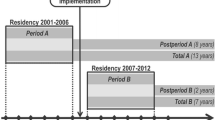Abstract
Purpose
This study investigated the impact of a PhD-led research infrastructure on scholarly output for an orthopedic residency program. We hypothesized that a research infrastructure leveraging non-surgeon faculty and medical students could increase research capacity and productivity in an orthopedic residency program.
Methods
In 2018, a PhD kinesiologist was hired by a community-based university-affiliated medical center to augment research in collaboration with volunteer clinical faculty orthopedic surgeons. Initiatives implemented included: (1) standardized patient reported outcome collection tools (2) creation of a seven-year retrospective joint registry for a high-volume (> 600/year) arthroplasty surgeon, with continued prospective collection (3) expansion of research staff with three data collection employees (4) creation of a monthly research lecture series for medical students conducted by the kinesiologist. Publications before and after implementation of the research infrastructure (2011–2021) were recorded through PubMed and annual faculty surveys.
Results
Peer-reviewed, indexed publications substantially increased by 491% and 305% for residents and faculty, respectively, since the inception of the kinesiologist-led research program. Over three years, 244 authorships on publications, presentations, and abstracts have been provided for medical students and residents through the lecture series. In subsequent years, a peer mentorship program was established, with senior medical students and residents serving as research mentors under faculty supervision.
Conclusion
A PhD-led orthopedic research program leveraging medical students resulted in a substantial increase in peer-reviewed publications. This model may be attractive to community medical centers with volunteer clinical faculty seeking to enhance their scholarly environment and provide additional research opportunities for residents and students.

Similar content being viewed by others

References
ACGME program requirements for graduate medical education in orthopaedic surgery. in: accreditation council for graduate medical education: orthopaedic surgery. 2020. https://www.acgme.org/specialties/orthopaedic-surgery/program-requirements-and-faqs-and-applications/. Accessed April 25, 2022.
Berger GK, Neilson JC, King DM, Wooldridge AN. Impact of clinical research coordinators on research output in orthopedic surgery. J Comp Eff Res. 2021;10(15):1153–8. https://doi.org/10.2217/cer-2021-0020.
Robbins L, Bostrom M, Marx R, Roberts T, Sculco TP. Restructuring the orthopedic resident research curriculum to increase scholarly activity. J Grad Med Educ. 2013;5(4):646–51. https://doi.org/10.4300/JGME-D-12-00303.1.
Torres D, Gugala Z, Lindsey RW. A dedicated research program increases the quantity and quality of orthopaedic resident publications. Clin Orthop Relat Res. 2015;473(4):1515–21. https://doi.org/10.1007/s11999-014-4080-1.
Stevenson MD, Smigielski EM, Naifeh MM, Abramson EL, Todd C, Li ST. Increasing scholarly activity productivity during residency: a systematic review. Acad Med. 2017;92(2):250–66. https://doi.org/10.1097/ACM.0000000000001169.
Rosier RN. Institutional barriers to the orthopaedic clinician-scientist. Clin Orthop Relat Res. 2006;449:159–64. https://doi.org/10.1097/01.blo.0000229286.83603.ce.
Thangamathesvaran L, Patel M, N, Siddiqui SH, et al. The otolaryngology match: a bibliometric analysis of 222 first-year residents. Laryngoscope. 2019. https://doi.org/10.1002/lary.27460.
Bigelow BF, Siegel N, Toci GR, Elsner JA, Hicks CW, Abularrage CJ. Bibliometric review of medical student research before matching integrated vascular surgery. J Surg Res. 2021;263:251–7. https://doi.org/10.1016/j.jss.2021.01.015.
Mean Number of Abstracts, Presentations, and Publications of U.S. MD Seniors by Preferred Specialty and Match Status. In: Charting Outcomes in the Match: Senior Students of U.S. MD Medical Schools. The Match: National Residency Matching Program. 2020. https://www.nrmp.org/match-data-analytics/residency-data-reports/. Accessed April 25, 2022.
Mun F, Scott AR, Cui D, et al. A comparison of orthopaedic surgery and internal medicine perceptions of USMLE Step 1 pass/fail scoring [published correction appears. BMC Med Educ. 2021. https://doi.org/10.1186/s12909-021-02699-4.
Schrock JB, Kraeutler MJ, Dayton MR, McCarty EC. A comparison of matched and unmatched orthopaedic surgery residency applicants from 2006 to 2014: data from the national resident matching program. J Bone Joint Surg Am. 2017. https://doi.org/10.2106/JBJS.16.00293.
Schexnayder S, Starring H, Fury M, Mora A, Leonardi C, Dasa V. The formation of a medical student research committee and its impact on involvement in departmental research. Med Educ Online. 2018;23(1):1424449. https://doi.org/10.1080/10872981.2018.1424449.
Ahn J, Donegan DJ, Lawrence JT, Halpern SD, Mehta S. The future of the orthopaedic clinician-scientist: part II: identification of factors that may influence orthopaedic residents’ intent to perform research. J Bone Jt Surg Am. 2010;92(4):1041–6. https://doi.org/10.2106/JBJS.I.00504.
Jha P, Thakur A, Klumb J, Bhandari S. Perceptions of fourth-year medical students on writing and presenting case reports. Cureus. 2018. https://doi.org/10.7759/cureus.2341.
Oyibo SO. Involving junior doctors in medical article publishing: is it an effective method of teaching? Adv Med Educ Pract. 2017;8:669–74. https://doi.org/10.2147/AMEP.S147431.
Author information
Authors and Affiliations
Contributions
Lawton—manuscript drafting and editing, literature review. Andrews—manuscript drafting and editing, study concept design. Nakasone—manuscript editing, data acquisition, study concept design. Steinemann—manuscript editing, data acquisition, study concept design.
Corresponding author
Ethics declarations
Conflict of interest
On behalf of all authors, the corresponding author states that there is no conflict of interest.
Rights and permissions
Springer Nature or its licensor holds exclusive rights to this article under a publishing agreement with the author(s) or other rightsholder(s); author self-archiving of the accepted manuscript version of this article is solely governed by the terms of such publishing agreement and applicable law.
About this article
Cite this article
Lawton, D.R.Y., Andrews, S.N., Nakasone, C.K. et al. New research infrastructure increases scholarly activity for orthopedic residency program. Global Surg Educ 1, 44 (2022). https://doi.org/10.1007/s44186-022-00050-z
Received:
Revised:
Accepted:
Published:
DOI: https://doi.org/10.1007/s44186-022-00050-z



